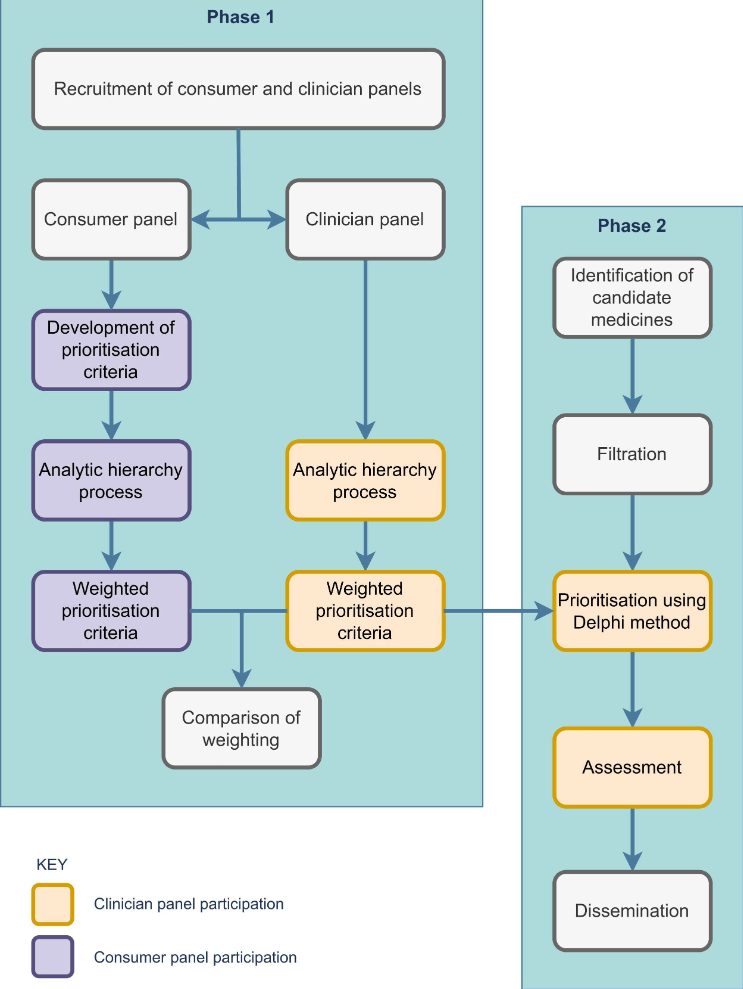By incorporating the needs of patients, a new prioritisation technique aims to provide equitable access to life-saving medicines.
In healthcare, timely access to effective treatments is vital. However, the rising cost of cancer medicines is placing pressure on the individuals and societies who bear this price.
Health Technology Assessment (HTA) forms an important part of reimbursement decisions and aims to recommend medicines that balance clinical benefit with cost. However, Australia’s current assessment process is facing scrutiny for its cumbersome nature and lack of transparency.
To address this, a novel methodology has been developed to prioritise new cancer medicines while they are still in the pipeline. The unique approach was developed with consumers and integrates patient preferences into a technique known as horizon scanning or HS.
The HS study was led by Dr Jennifer Soon from the Cancer Health Services Research team with researchers from the University of Melbourne, Peter MacCallum Cancer Centre, Walter and Eliza Hall Institute of Research, the Erasmus School of Health Policy and Management and other national and international experts.
Equitable access to high-cost emerging cancer medications is particularly emotive given the often urgent timeframes imposed by the nature of the disease.
The project developed a proof-of-concept tailorable and agile approach to HS, highlighting the importance of incorporating the consumer voice.
Early detection of promising new medicines will enable HTA agencies to streamline the assessment process and adopt a strategic approach to approvals that examine the implications of novel medicines in the context of existing and pipeline therapies.
As pipeline medicines are almost exclusively high-cost, this approach will be increasingly important to ensure the financial sustainability of healthcare.
The research team assembled three cancer-specific clinician panels (27 participants) and a consumer panel (seven participants).
Six prioritisation criteria were developed with consumer input. These included drug toxicity, patient quality of life (QoL), cost savings, strength of evidence, survival rate and level of unmet need (where a cancer has limited or no treatment options).
Weightings were adjusted according to whether a treatment was curative or non-curative. In both scenarios, consumers prioritised toxicity and QoL over survival gains, whereas clinicians prioritised survival.
The clinician panels scored shortlisted pipeline medicines against these criteria to arrive at a final five medicines for each cancer type.
Since completion in October 2021, the new HS technique has accurately identified 70 per cent of relevant medicines submitted for Pharmaceutical Benefits Advisory Committee assessment and 60 per cent of the medicines that received a positive recommendation.
The new method provides a reproducible blueprint for adaptation to other healthcare settings and makes an important step towards a more responsive and patient-centric healthcare system.
Fig. 1. Overview of horizon scan methodology
Next Steps
The medicines identified in the HS will be used in PRIMCAT economic modelling to predict how many patients will use these new medicines and the impact on their subsequent treatment patterns and health resource utilisation. This information will be of use to those involved with health reimbursement decisions, including health policy makers and HTA agencies.
Funding
PRIMCAT is funded by the Medical Research Future Fund (MRF1199701) Preventative and Public Health THSCOR 2019: Targeted Health Systems and Community Organisation Research. All published materials are the responsibility of the research team and do not reflect the views of the Commonwealth.
Acknowledgements
We acknowledge the foundational work of the PRIMCAT research team and consumer panel in supporting this research (primcat.org).
The University of Melbourne acknowledges the MAESTRrO Database as a source of global Health Technology Assessment data utilised in this research.
Publication
Soon, Jennifer A. et al (2023) A tailored approach to horizon scanning for cancer medicines, Journal of Cancer Policy, https://doi.org/10.1016/j.jcpo.2023.100441
First published on 22 November 2023.
Share this article
Keep reading
-
GABA inhibitory neurotransmitter excites cells in the adult brain
GABA – a neurotransmitter previously thought to have only inhibitory activity in the brains of adult mammals – can also excite certain types of cells.
-
A new coating boosts the performance of implantable electrodes
A new coating improves the lifespan and performance of carbon-fibre microelectrodes, enabling two-way communication with single cells.
-
App offers mental health support for carers
An app for carers of young people with mental illness appears to enable therapeutic bonds to grow between users and the app.
